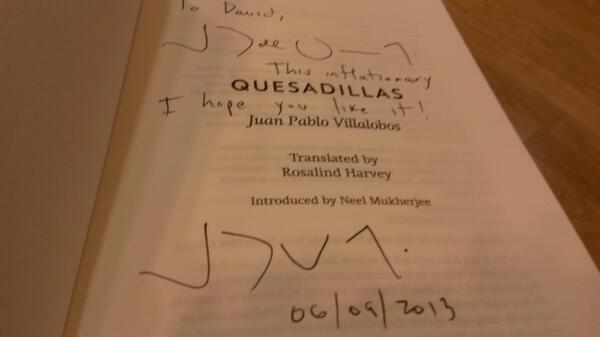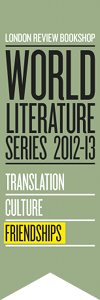I’ve been on the road (well, on the train, really) this week to a couple of bookish events that I’d like to share with you. One was the Peirene Experience, an evening to celebrate the publication of Mr Darwin’s Gardener by Kristina Carlson, the latest title from Peirene Press. Though I’ve read all their books, I have never managed to make it along to a Peirene event until now, and I had always wanted to go to one. I went to the second event more on spec, as part of my plan to get more into world literature. It was part of the London Review Bookshop’s World Literature Series, this time focusing on Japan. As you’ll see, I’m very glad to have been to both evenings.
***
 So, to Belgravia Books on Wednesday, where Peirene Press’s founder and publisher, Meike Ziervogel, hosted as three guests each offered their own take on the book. First up was actor Adam Venus, who gave two readings over the course of the evening. His first was the book’s opening, and it was fascinating to realise just how different this felt from when I had read it silently to myself. Carlson’s text switches back and forth between a third-person narrator and the inner thoughts of various villagers; I’d read this quite steadily, but Venus brought home the dynamism of Carlson’s style. His second reading, from near the end of the novel, focused more on Thomas Davies, the titular gardener who wonders what, if anything, he should believe in. Unlike the other first-person voices, Venus read Thomas’s thoughts in the same measured voice that he used for the narrator, which again placed an interesting contrast on the text that hadn’t struck me so strongly on first reading.
So, to Belgravia Books on Wednesday, where Peirene Press’s founder and publisher, Meike Ziervogel, hosted as three guests each offered their own take on the book. First up was actor Adam Venus, who gave two readings over the course of the evening. His first was the book’s opening, and it was fascinating to realise just how different this felt from when I had read it silently to myself. Carlson’s text switches back and forth between a third-person narrator and the inner thoughts of various villagers; I’d read this quite steadily, but Venus brought home the dynamism of Carlson’s style. His second reading, from near the end of the novel, focused more on Thomas Davies, the titular gardener who wonders what, if anything, he should believe in. Unlike the other first-person voices, Venus read Thomas’s thoughts in the same measured voice that he used for the narrator, which again placed an interesting contrast on the text that hadn’t struck me so strongly on first reading.
The second performer was violinist Javier Garcia Aranda, who performed his own compositions (a series of sketches, and later a more extended piece) interpreting various extracts from the text. This was almost a musical remix of Carlson’s novel, as Aranda brought the focus in on a few sentences at a time, without necessarily needing reference to their wider context. I’m not particularly musical, so I don’t think there’s a lot I can say about this; but I was impressed at Aranda’s range, and really appreciated being able to see the close connections between text and music.
After the first reading and recital, Emily Jeremiah, one of the translators of Mr Darwin’s Gardener, spoke about some of the challenges of creating an English version from the Finnish original – which must be even greater given how idiosyncratic is this particular book. Jeremiah gave one example of a four-sentence extract In English that had been a single sentence in Finnish, the two languages’ grammars being so different. The other day, I was reading a piece that Stu Allen wrote for the Booktrust website, where he talks about a literary translator being like a musician who ‘plays’ the author’s composition. I think Jeremiah’s talk here showed just how true that is – and, of course, Venus and Aranda showed how something similar can be true for different kinds of performance.
I can’t speak for anyone who hadn’t read Mr Darwin’s Gardener in advance of the event, but I thought this was a superb introduction to Carlson’s novel. The reading and music gave a way in to the novel on an instinctual and emotional level, before Jeremiah turned to more practical matters. But the emphasis was still on personal responses, and this is what I found especially valuable as someone who had already read the book – the opportunity to experience how others saw it. I look forward to more Peirene Press events in the future, and I’d love to see more literary events this creative.
***
 From Belgravia Books to the London Review Bookshop, and the latest in their monthly World Literature Series, which took place yesterday. The bookshop’s guest was author and editor Masashi Matsuie, who began the evening with an illustrated talk on Japanese book design. He explained that modern Japanese hardcover books would often come in their own separate box (though this is less common nowadays – the high point for the practice was in the 1960s and ‘70s). They would also have an illustrated page in a different paper stock before the title page. Matsuie showed pictures of some beautiful books – volumes with illustrated endpapers, titles embossed on their spines, illustrations impress into front covers. It was clear to me just how much care and attention had gone into these designs. I think sometimes book design can be undervalued or taken for granted, so it was great to see it being celebrated here.
From Belgravia Books to the London Review Bookshop, and the latest in their monthly World Literature Series, which took place yesterday. The bookshop’s guest was author and editor Masashi Matsuie, who began the evening with an illustrated talk on Japanese book design. He explained that modern Japanese hardcover books would often come in their own separate box (though this is less common nowadays – the high point for the practice was in the 1960s and ‘70s). They would also have an illustrated page in a different paper stock before the title page. Matsuie showed pictures of some beautiful books – volumes with illustrated endpapers, titles embossed on their spines, illustrations impress into front covers. It was clear to me just how much care and attention had gone into these designs. I think sometimes book design can be undervalued or taken for granted, so it was great to see it being celebrated here.
Translator Michael Emmerich then took to the stage to interview Matsuie, after a reading from Matsuie’s 2012 debut novel, At the Foot of the Volcano (delivered alternately in Japanese by Matsuie and English by Emmerich). The novel (not yet published in English, but I hope it will be) concerns the relationship between an architecture student and the older architect whose work he admires and whose practice he joins. Matsuie said that drew on his own career in publishing to write about his protagonist’s architecture career, and that he himself had thought of being an architect until he realised he didn’t have the right skills. Emmerich commented that it seemed to him almost as though the spaces were more important than the characters in the novel; and I could certainly imagine that from the extract we heard, which vividly described a church designed by the protagonist’s hero (I especially loved the image of the church looking “like a grey cat curled up in a ball waiting to nap”). Emmerich asked Matsuie if there was a parallel for him between designing books and designing architectural spaces; the author replied that he hadn’t thought of it that way before, but there probably was something to that. This is just one example of what an interesting and illuminating evening this was.
I must mention one more thing. During the Q&A session afterwards, an audience member asked if it were possible to see any of the boxed books, but Matsuie said that unfortunately he hadn’t brought any samples with him. The bookseller holding the roving mic then immediately turned around, pulled a copy of B.S. Johnson’s The Unfortunates from the shelf and handed it to Matsuie, who had never come across the book before and was keen to take a closer look at it. I noticed in passing that The Unfortunates is still on sale with the same design as it had when I first saw a copy in 1999. That’s a testament to good book design, just as the whole incident is a testament to good bookshops. I’d like to thank everyone involved in putting on last night’s event (and, of course, Peirene’s on Wednesday). I thoroughly enjoyed it, learned a lot… and I already have next month’s World Lit Series event in my diary.
Like this:
Like Loading...
 The evening was hosted by the excellent
The evening was hosted by the excellent 


 In the airport bookshop looking at the bestsellers? This year’s top surprise bestseller has been
In the airport bookshop looking at the bestsellers? This year’s top surprise bestseller has been 
 Last night, the 2013 Edge Hill Short Story Prize was
Last night, the 2013 Edge Hill Short Story Prize was  So, to
So, to 
 I was particularly pleased to take part in the “Best Books of 2012” panel, where a group of us recommended some favourite reads from last year. I went for Karen Lord’s
I was particularly pleased to take part in the “Best Books of 2012” panel, where a group of us recommended some favourite reads from last year. I went for Karen Lord’s  To celebrate the launch of the
To celebrate the launch of the
Recent Comments